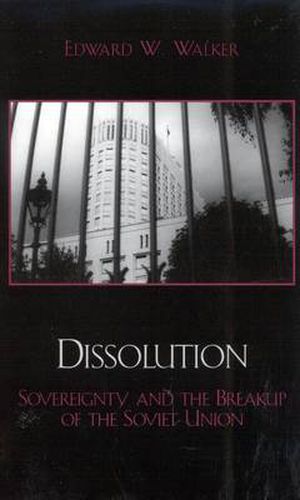Readings Newsletter
Become a Readings Member to make your shopping experience even easier.
Sign in or sign up for free!
You’re not far away from qualifying for FREE standard shipping within Australia
You’ve qualified for FREE standard shipping within Australia
The cart is loading…






In December 1991, the Soviet Union passed into history as a legal entity, breaking apart into 15 successor states. This book explains why. Walker argues against much of the conventional wisdom and scholarly literature on the break-up, which emphasizes what he calls the demand side of the problem, or the role or nationalist mobilization and the rise of separatist aspirations in the USSR’s union republics. He points out that support for dissolution was limited to a handful of republics that included only a small portion of the Soviet population. Instead, the author highlights the critical role played by the USSR’s ethno-federal system, as well as the normative claims and legitimizing myths of Soviet nationality policy. These institutions and myths empowered the anti-union opposition even in those union republics where they had limited support, and they help account for the highly ineffective strategy that Gorbachev adopted to overcome the USSR’s nationality crisis . Walker also shows how confusion over the meaning of some of the key terms of Soviet political discourse during perestroika- particularly sovereignty but also union , federation , confederation and independence - contributed to a fog of war that helped bring about the full disintegration of the USSR, an outcome that surprisingly few desired.
$9.00 standard shipping within Australia
FREE standard shipping within Australia for orders over $100.00
Express & International shipping calculated at checkout
In December 1991, the Soviet Union passed into history as a legal entity, breaking apart into 15 successor states. This book explains why. Walker argues against much of the conventional wisdom and scholarly literature on the break-up, which emphasizes what he calls the demand side of the problem, or the role or nationalist mobilization and the rise of separatist aspirations in the USSR’s union republics. He points out that support for dissolution was limited to a handful of republics that included only a small portion of the Soviet population. Instead, the author highlights the critical role played by the USSR’s ethno-federal system, as well as the normative claims and legitimizing myths of Soviet nationality policy. These institutions and myths empowered the anti-union opposition even in those union republics where they had limited support, and they help account for the highly ineffective strategy that Gorbachev adopted to overcome the USSR’s nationality crisis . Walker also shows how confusion over the meaning of some of the key terms of Soviet political discourse during perestroika- particularly sovereignty but also union , federation , confederation and independence - contributed to a fog of war that helped bring about the full disintegration of the USSR, an outcome that surprisingly few desired.